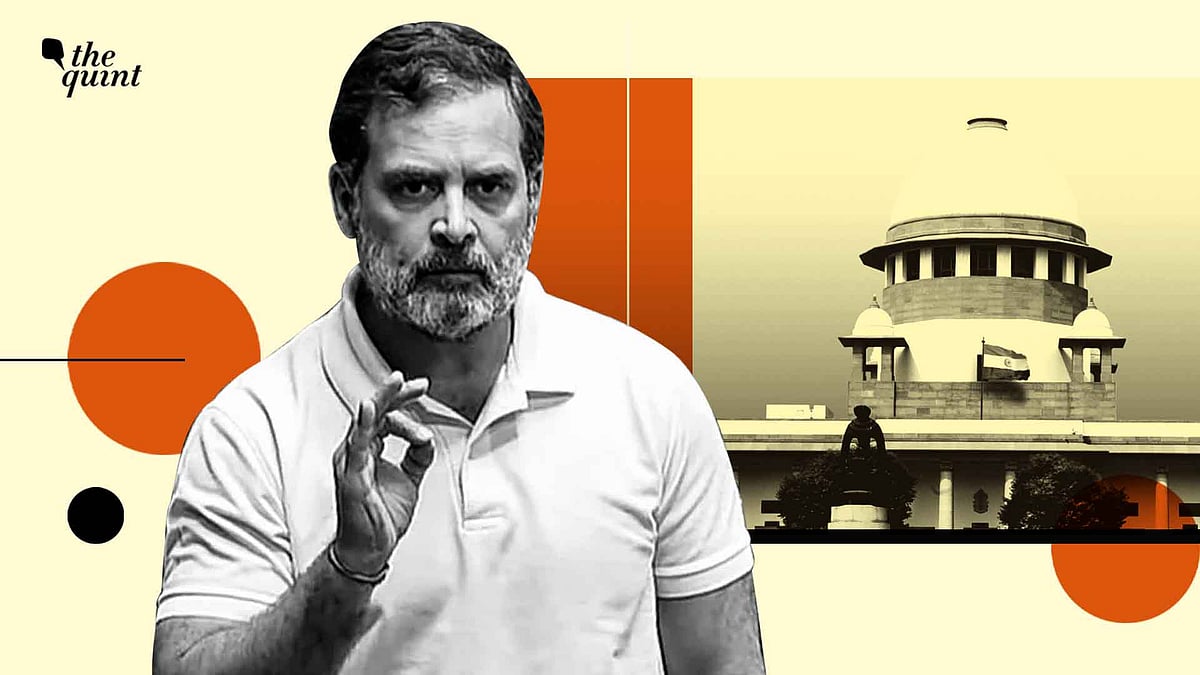
Rahul Gandhi, Patriotism & Supreme Court: Who Gets to Define Love for India?
SC is a custodian of the Constitution, not a Unified Patriotism Certification Authority, writes Madhavan Narayanan.

advertisement
Is there a law in India that defines patriotism? That is the question that popped up in my mind after a judicial skirmish involving Congress leader Rahul Gandhi and a Supreme Court judge on Monday, 4 August.
His sister and fellow Lok Sabha MP Priyanka Gandhi has done well to question the top court’s authority in a virtue-signalling act on patriotism. However, in an atmosphere of increasing institutional stress in India, it makes sense to examine the concept of love for one’s country.
It is difficult to defend the outspoken Rahul Gandhi, Leader of the Opposition, who is increasingly and often in the news for saying things that are controversial at times, and outrageous at others, like he did last week when he unconvincingly agreed with US president Donald Trump’s preposterous statement that India had a “dead economy.”
But this is not about the Gandhi scion, but the role of the Opposition, freedom of expression, and the reach and the role of the Supreme Court.
Patriotism, Dissent and Democracy
“A patriot must always be ready to defend his country against his government,” goes a famous quote by Edward Abbey.
Was Rahul Gandhi doing that when he spoke of a Chinese incursion in India in the Ladakh region in 2020?
The internet is swarming with quotes about patriotism – from writers, humourists, politicians, and philosophers. Cynical, funny, sentimental, insightful. It is such a rainbow of options and opinions that make patriotism a fascinating idea. It is a subject to be contemplated upon, not one to be adjudicated on.
As an inference, it also means that the Supreme Court of India is a custodian of the Constitution, not a Unified Patriotism Certification Authority of India.
False Equations: Patriotism vs Xenophobia
Xenophobia is certainly not patriotism. And most certainly, patriotism is not a blind adherence to the belief that the government is always right, whether the party in power is the Bharatiya Janata Party (BJP), the Congress, or whoever.
In such a context, oral remarks by judges are meant to provoke thought, not invoke obedience.
“How did you get to know that 2,000 square km of Indian territory was occupied? Were you there? Do you have any credible proof? If you are a true Indian, you would not say all these things,” Justice Dipankar Datta told Gandhi, whose lawyers remarked that a “true Indian would also say our Indian soldiers were beaten up.”
There are videos on the latter but no evidence of the former—either to confirm or to deny Gandhi’s claim.
Here comes the catch: Has the government disclosed the relevant facts? If Gandhi is not accurate, what is the evidence that he is not?
The answer is blowing in the monsoon winds of the capital, but Gandhi’s lawyers spoke of his remarks as one made in the public interest.
Accountability and Citizenship
It boils down to questions that deserve attention: Is the army not accountable to the government and the government, in turn, to the citizens—and therefore the public?
What has happened in recent days is that in revision of electoral rolls, the Election Commission of India has virtually declared itself to be a proxy authority to issue citizenship certificates while the Supreme Court issues informal guidelines on patriotism.
The Right to Information Act, Parliament questions, and press conferences exist for a reason.
Where official data is not forthcoming, media and public figures like Opposition leaders are forced to rely on hearsay and conjecture that make them fall short in doing things in the public interest.
Transparency and Judicial Responsibility
The Supreme Court, which routinely handles public interest litigation, needs to ask some questions on that as well.
Mature democracies are not scared of sharing bad news or data. Transparency is a friend of democracy.
One expects the Supreme Court to understand this, alongside the fact that judges are as accountable for their words as politicians. One controversial remark hardly does justice when it puts down another.
(The author is a senior journalist and commentator who has worked for Reuters, Economic Times, Business Standard, and Hindustan Times. He can be reached on Twitter @madversity. This is an opinion piece and the views expressed above are the author’s own. The Quint neither endorses nor is responsible for the same.)
- Access to all paywalled content on site
- Ad-free experience across The Quint
- Early previews of our Special Projects
Published: undefined